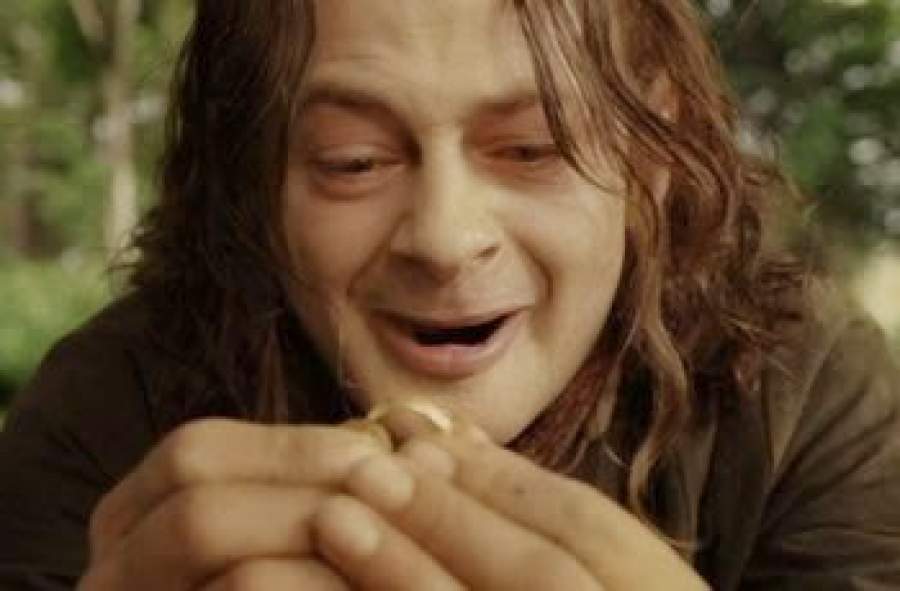Gollum, the Mirror of Man

Gollum is the sneaky, sleazy trickster in J.R.R.Tolkien’s masterpiece The Lord of the Rings. He was once a hobbit named Sméagol, but he came under the spell of Sauron’s chief Ring of Power.
Sméagol was seduced by the ring’s dark beauty, and over time became the disgusting character Gollum. Transformed, he strokes the ring. He loves the ring. He calls it “my precious.”
It seems every hint of goodness in Sméagol disappears. It gets devoured by the all consuming evil of the ring. Gollum becomes ruthless and cruel. But also weak and cowardly. A scheming, lying, murderer and thief, Gollum is also a pitiful, sniveling, loathsome creature.
Enslaved by Sin
In Peter Jackson’s film version of the epic tale, Gollum is portrayed perfectly. As the story unfolds we see what happens to humans who are enslaved by sin.
If we watch closely we will learn powerful truths about fallen human nature. First we observe that Gollum started out good. Sméagol was just like the other happy hobbits. He was created good, and that goodness never died completely.
In every scene where Sméagol appears in Jackson’s film, a glint of goodness shines through. Gollum’s devious nastiness overshadows, but never completely extinguishes it. Even as he plunges into the fires of Mount Doom, there lives in Gollum’s heart a desire that is not totally corrupted.
We Love the Good, But Badly
The desire in his heart has always been for something good — for prosperity and power, for long life, for beauty and goodness. Our desires are always for something good — even when the desires are terribly distorted. The desires are not evil, but they are distorted. Our problem is that we seek to fulfill the desires in the wrong way. Sméagol sought to fulfill his desires by using the magic ring.
Like Sméagol, all of us are created in God’s good image. But like Gollum, all of us have fallen into the dark. We search for the magic ring that will bring us instant gratification. That is, wealth, power, life and all that is beautiful, good and true.
Pick Your Precious
The magic ring could be most anything. Our magic ring might be be drugs, alcohol, sexual pleasure, wealth, worldly success, prestige or worldly power. Whatever shortcut to happiness we choose? That is the magic ring that will enslave us and turn us from Sméagol to Gollum. Whatever false god we serve becomes our “precious.”
Our desires are always for something good — even when the desires are terribly distorted. The desires are not evil, but they are distorted. Our problem is that we seek to fulfill the desires in the wrong way. Sméagol sought to fulfill his desires by using the magic ring.
Because we grasp “our precious,” the image of God in us is wounded, but not utterly destroyed. We need to heal and restore it. With God’s help, we can turn from our twisted desire and false attachments. We can do something about it. Our choices matter. Our actions matter. Even at the darkest hour, we can still choose to let go of our precious and turn to the light.
A Dark Mirror for Us
The character of Gollum is so fascinating to us because, even if we are not conscious of it, we know we are looking a reflection of ourselves in Gollum. As he struggles and writhes in agony because of his slavery to the ring we see our own struggles to turn from the darkness to the light. We see our own struggles to forsake our addictions and cast “our Precious” into the fires from whence it came.
That’s why Frodo continues to have pity on Gollum. He knows what Gollum was and sees what he still could be. Frodo knows the terrible corrupting power of the ring. He’s seen how it partly corrupted Bilbo. He sees how it’s made a monster of Sméagol. And Frodo feels how the ring is slowly transforming him, as well. But this knowledge breeds compassion, not judgment in his heart. He looks on Gollum with pity instead of blame.
It’s the same with us. Twisted and deformed by sin, the image of God glimmers within. Christ, echoed so well in Frodo, knows the burden we bear, and sees not how deformed we are, but how beautiful we were, and how beautiful we can be.
Dwight Longenecker is a Catholic pastor from Greenville, South Carolina. Read his blog, listen to his podcasts, browse his books and be in touch at dwightlongenecker.com







